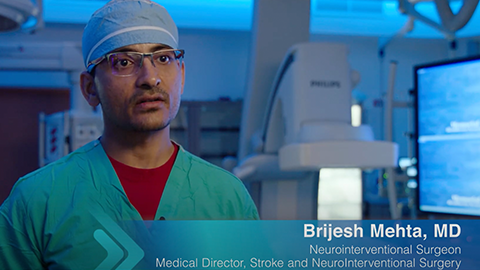Memorial Neuroscience Institute Uses AI to Optimize Care and Positive Outcomes for Stroke Patients
May 12, 2022

A 29-year-old firefighter and paramedic, Eric, wasn’t feeling well after finishing a workout. He tried to send a text and could not move his left thumb and then his left leg went numb. His trainer also noticed Eric was slurring, so he called 9-1-1.
Eric was transported by Emergency Medical Services (EMS) to the Joint Commission certified Comprehensive Stroke Center at Memorial Hospital West. Based on Memorial stroke protocol, the hospital had already been alerted by EMS paramedics and the neurointerventional surgery team was ready to perform a CT scan and treat in the catheterization laboratory, commonly known as the cath lab, an examination room with diagnostic imaging equipment used to visualize the arteries.
The hospital is equipped with RapidAI® imaging platform, which triggered an alert as soon as the scan results were available to Brijesh P. Mehta, MD, medical director of the Comprehensive Stroke Program and Neurointerventional Surgery at Memorial Neuroscience Institute. He received the RapidAI alert on his smartphone and smartwatch, showing the software’s automated detection of LVO (large vessel occlusion), prompting him to mobilize the cath lab team and fast-track Eric for mechanical thrombectomy, a clot-retrieval procedure to remove the blood clot causing his stroke.
“Before RapidAI, we were tethered to our workstations and had to take multiple steps to open the software to view the scans. It was cumbersome, and there was no automation,” said Dr. Mehta. “The value of artificial intelligence is that it streamlines our workflow, cuts down time and allows us to make decisions quickly and effectively at the point of care to benefit our patients.”
In Eric’s case, the blocked artery was fully opened, and blood flow restored after the thrombectomy procedure in under 60 minutes from his arrival at the hospital.
“Luckily, I had Dr. Mehta and the team at Memorial along with my trainer who recognized the stroke signs. So I’m just grateful to be alive right now with no deficits," said Eric.
Since the program’s trial period began at Memorial Regional Hospital in 2017, the imaging platform has expanded to Memorial Hospital West, Memorial Hospital Miramar and Memorial Hospital Pembroke. RapidAI has identified more than 8,400 strokes and helped the neurointerventional surgery team reduce door to treatment times, which is critical because nearly 2 million neurons are at risk of permanent injury every minute that elapses during a stroke.
About Memorial Neuroscience Institute
Memorial Neuroscience Institute offers a multidisciplinary team of experts who provides advanced diagnoses, leading-edge treatments, compassionate care, rehabilitation, and complete follow-up for some of the most complex neurological conditions and injuries. Neurosurgeons, neurologists, neurointerventional surgeons, neuro-oncologists, neurocritical care physicians, and neuropsychologists, among others, collaborate to provide a complete continuum of neurological care. Our neurology and neurosurgery specialists offer expertise in: stroke, brain aneurysms, brain arteriovenous malformations, brain tumors, epilepsy, MS, neuromuscular disorders, spine disorders, and more.
Stroke Awareness Rapid AI Software

